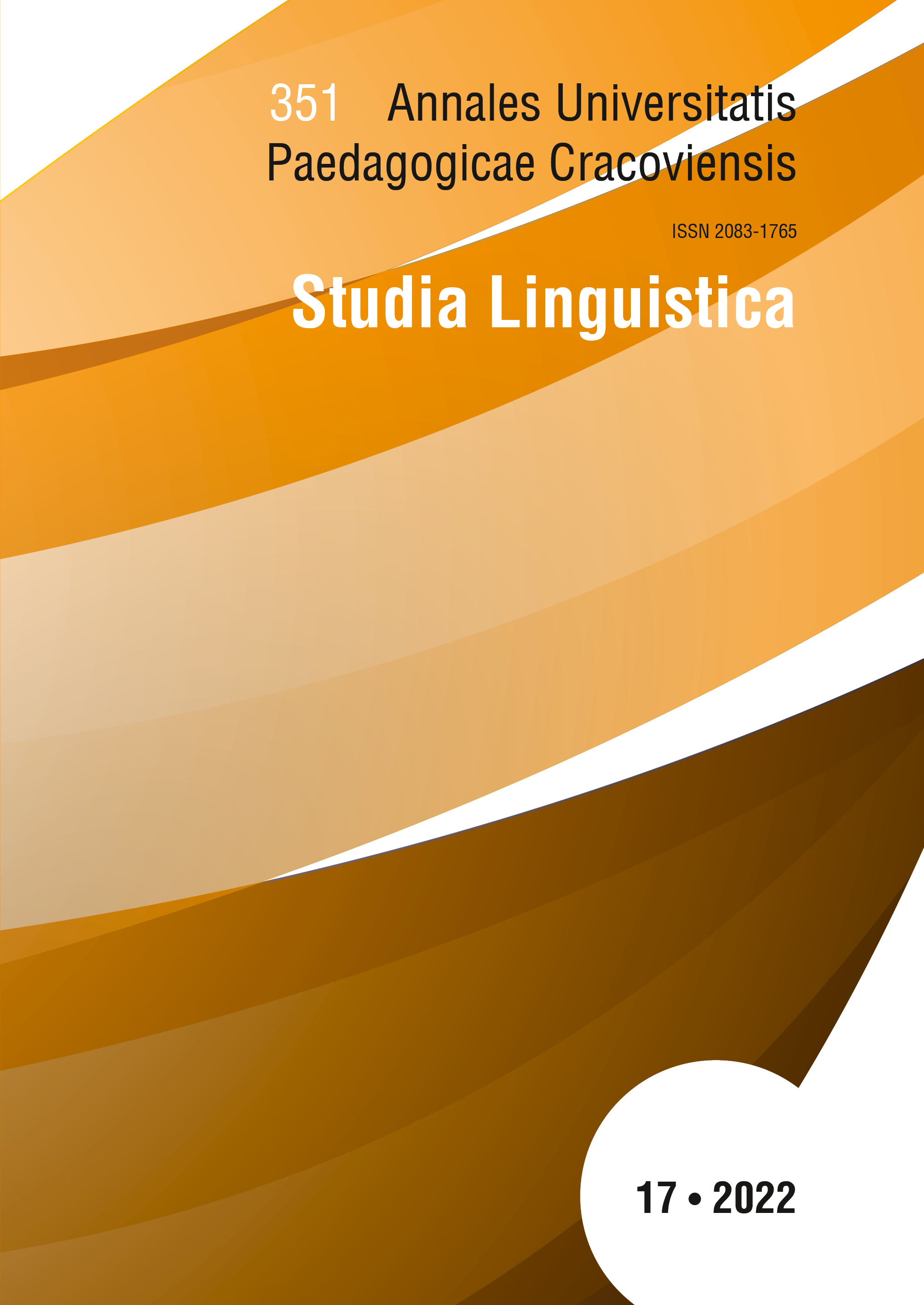Maintaining and breaking the rules of communication ethics in the discussion about the election of the Head of the Polish Scouting and Guiding Association
Main Article Content
Abstract
There are 7 principles of ethical communication disscused in the article. Presented rules were excerpted from the review of word ethics literature. These are: the principle of equality, the principle of inclusion, the principle of honesty and truthfulness, the principle of non-coercion, the principle of non-dehumanization, the principle of taking into account human complexity and multidimensionality, and the principle of preserving and respecting autonomy. The article presents types of linguistic behaviour, which proves that the indicated rules are respected and disregarded in the communication process. In order to systematize the analysis of both types of behaviour, in the article a code key was used. At the same time, by presenting the categories that make up the code key, it is a tool that can be successfully used to study communication ethics in other types of texts.
Downloads
Article Details

This work is licensed under a Creative Commons Attribution-NonCommercial-NoDerivatives 4.0 International License.
Author, submitting a text to the editorial board of the journal “Annales Universitatis Paedagogicae Cracoviensis. Studia Linguistica", certifies that the content of the article has not been published so far and that the work does not violate in any way the copyright or related rights of other person, as well as other rights of third parties, and that no one's rights to the work (or any part thereof) have been missed. After signing the contract, the property rights to the published materials are transferred to the University of the National Education Commission, Krakow.
“Annales Universitatis Paedagogicae Cracoviensis. Studia Linguistica” is an open access journal, and all its content is made available free of charge to users and institutions under the Creative Commons CC-BY-NC-ND 4.0 license (attribution, non-commercial use, no derivative works). Under this license, the authors agree that their work may be lawfully reused for any purpose, except for commercial purposes, without the prior consent of the author or publisher. Everyone can read, download, copy, print, distribute and process these works, provided that the author's marking and the original publication place are correct. Published texts may not be used to create derivative works (e.g. to translate and publish in another language without the consent of the publisher). This is in line with the BOAI (Budapest Open Access Initiative) definition. "Studia Linguistica" does not charge for submitting or processing articles.
References
Awdiejew A., Habrajska G., 2009, Strategie propagandowe i agitacyjne, [w:] Rozmowy o komunikacji 3: Problemy komunikacji społecznej, red. G. Habrajska, Łask, s. 9–54.
Google Scholar
Bartmiński J., 2017, Etyka słowa a potoczny wzorzec komunikacji, [w:] Etyka słowa. Wybór opracowań, red. J. Bartmiński, S. Niebrzegowska-Bartmińska, M. Nowosad-Bakalarczyk, J. Puzynina, Lublin, s. 39–50.
Google Scholar
Cegieła A., 2013, Słowa niebezpieczne i niepożądane w przestrzeni społecznej. Etyka słowa a poprawność polityczna, „Poradnik Językowy”, nr 10, s. 57–70.
Google Scholar
Cegieła A., 2014a, Słowa i ludzie. Wprowadzenie do etyki słowa, Warszawa.
Google Scholar
Cegieła A., 2014b, Etyka słowa w dyskursie publicznym, [w:] Słowo we współczesnych dyskursach, red. K. Jachimowska, B. Kudra, E. Szkudlarek-Śmiechowicz, Łódź, s. 23–34.
Google Scholar
Cegieła A., 2019, Na czym polega przemoc w języku komunikacji publicznej?, „Poradnik Językowy”, nr 8, s. 7–20.
Google Scholar
van Dijk T.A. (red.), 2001, Dyskurs jako struktura i proces, Warszawa.
Google Scholar
Dudziak A., 2019, Wokół podstawowych zagadnień metodologicznych i propozycji badawczych w zakresie etyki komunikacji językowej, „Roczniki Humanistyczne”, Tom LXVII, z. 6, s. 89–104.
Google Scholar
Giza A., 1993, Na czym polega „etyczna komunikacja”?, [w:] Etyka międzyludzkiej komunikacji, red. J. Puzynina, Warszawa, s. 17–20.
Google Scholar
Jachymek K., w przygotowaniu, Wyznaczniki etyki komunikacyjnej. Klucz kodowy.
Google Scholar
Jachymek K., w recenzji, Zastosowanie klucza kodowego jako narzędzia analizy etyki komunikacyjnej (na podstawie dyskusji o wyborze Naczelnika ZHP).
Google Scholar
Kapuściński R., 1993, Środki masowego przekazu a etyka komunikacji, [w:] Etyka międzyludzkiej komunikacji, red. J. Puzynina, Warszawa, s. 59–61.
Google Scholar
Marcjanik M., 2017, Miejsce etykiety językowej wśród wartości. Uwagi ogólne, [w:] Etyka słowa. Wybór opracowań, red. J. Bartmiński, S. Niebrzegowska-Bartmińska, M. Nowosad-Bakalarczyk, J. Puzynina, Lublin, s. 339–345.
Google Scholar
Marcjanik M., 2007, Grzeczność w komunikacji językowej, Warszawa.
Google Scholar
Markowski A., 2017, Warunki właściwego użycia języka: etyka słowa – manipulacja językowa – nowomowa, [w:] Etyka słowa. Wybór opracowań, red. J. Bartmiński, S. Niebrzegowska-Bartmińska, M. Nowosad-Bakalarczyk, J. Puzynina, Lublin, s. 133–146.
Google Scholar
Nijakowski L., 2008, Mowa nienawiści w świetle teorii dyskursu, [w:] Analiza dyskursu w socjologii i dla socjologii, red. A. Horolets, Toruń, s. 113–133.
Google Scholar
Ożóg K., 2005, Współczesny model polskiej grzeczności językowej, [w:] Język a Kultura, t. 17: Życzliwość i agresja w języku i kulturze, red. A. Dąbrowska, A. Nowakowska, Wrocław, s. 9–16.
Google Scholar
Pręgowski M., 2012, Zarys aksjologii Internetu. Netykieta jako system norm i wartości sieci, Toruń.
Google Scholar
Puzynina J., 1993, O warunkach udanej komunikacji językowej, [w:] Etyka międzyludzkiej komunikacji, red. J. Puzynina, Warszawa, s. 21–23.
Google Scholar
Puzynina J., 1997, Słowo – wartość – kultura, Lublin.
Google Scholar
Puzynina J., Pajdzińska A., 2017, Etyka słowa, [w:] Etyka słowa. Wybór opracowań, red. J. Bartmiński, S. Niebrzegowska-Bartmińska, M. Nowosad-Bakalarczyk, J. Puzynina, Lublin, s. 21–29.
Google Scholar
Urzędowska A., 2017, Etyka czy etykieta? Charakterystyka komentarzy Facebooka w perspektywie poprawności językowej i obyczajowej, „Studia Socialia Cracoviensia” 9, nr 1, s. 173–187.
Google Scholar
Wierzbicka A., 2017, Trzy zasady etyki słowa, [w:] Etyka słowa. Wybór opracowań, red. J. Bartmiński, S. Niebrzegowska-Bartmińska, M. Nowosad-Bakalarczyk, J. Puzynina, Lublin, s. 67–73.
Google Scholar
Winczewski D., 2015, Reifikacja: Meandry teorii krytycznej, [w:] Filozoficzne rozważania o człowieku i nowoczesności, red. K. Bałękowski, K. Maciąg, Lublin, s. 7–22.
Google Scholar
Fanpage Z24 dostępny na portalu Facebook, „Facebook.pl”, https://www.facebook.com/Z24-189948942139/ (dostęp 24.11.2021).
Google Scholar
Związek Harcerstwa Polskiego – oficjalna strona organizacji, „ZHP.pl”, https://zhp.pl/ (dostęp 25.08.2021).
Google Scholar
